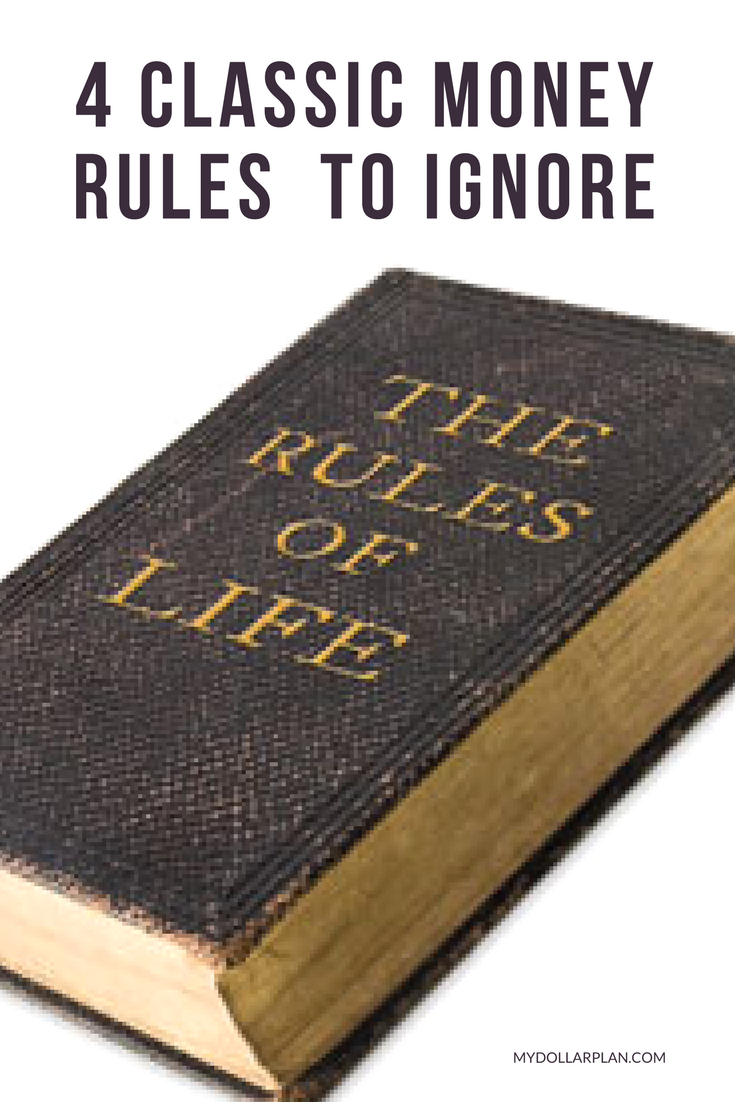4 Classic Money Rules You Might Want to Ignore

If you read any personal finance magazines or books, many of them tend to throw out the same information over and over again.
Much of this information has been adopted as standard money rules that you should follow.
But I am here to tell you that there are many money rules to ignore.

(Photo Credit: paulanning/pixabay)
4 Classic Money Rules You Might Want to Ignore
Below I list 4 classic money rules to ignore. While on the surface they do make sense, when you break them down you will see that an alternative option is a smarter choice.
Let’s get started!
1. Pay Off High Interest Debt First
Any finance person will make the argument that if you are in debt, the first debt you should pay off is the one with the highest interest rate. And from a math perspective, this is completely accurate. The higher your interest rate, the more interest you are going to be paying on that debt.
But this isn’t always the smartest move. This is because we are all wired and motivated by different things.
For example, I am a finance guy. I know that from a math point of view, I should pay off my debt with the highest interest rate. And when I was in debt, I tried this and failed. The reason was because my highest interest debt was also one of my larger loans.
I became frustrated because it felt like I wasn’t making any progress on getting debt free. So I switched things up and paid the debt with the smallest balance first. I quickly paid off this debt and got excited that I was making one less payment each month.
I followed this process through to eventually be debt free. Now I use credit cards strategically. Did I pay more interest in the long run by going this route? Sure I did. But I might not be debt free had I gone that route. At the end of the day, my goal was to be debt free, not pay the least amount of interest. I took the approach that was going to help me reach my goal.
Read More: 7 Ways to Payoff Credit Card Debt
2. Buy A House, Never Rent
This is the classic money rule and one of the most important money rules to ignore. The reason is because it can cost you dearly. As with the point above, from a math standpoint, buying a house is much smarter than renting.
You get tax deductions, build equity, and build wealth when you own a home. But you shouldn’t buy a house simply because it makes sense mathematically. You should buy a house because it makes sense for you.
If you just moved to a new area for a job, you are better off renting. There are a myriad of reasons why. First, you might not enjoy your job and want to move back home or somewhere else. Also, you don’t know the new city that well. Once you live there for a while, you might realize you like a different part of the city more.
Finally, you might buy a condo as a bachelor pad and end up meeting an amazing woman shortly thereafter and want to get married and have kids. Suddenly your condo isn’t the best housing situation.
Buying a house is the largest financial event in most people’s lives. It is critical that you get it right and buy a house you plan to live in for at least 5-10 years. Otherwise, if housing prices drop, you are going to be selling for a loss.
And if 2008 happens again, you will be selling for a huge loss. Don’t jump the gun and buy a house because it makes sense financially. Rent for a year to get a better idea of your new life. While you won’t be building equity, you will be getting valuable answers and information that will help you to buy the best house for you.
Read More: 14 Ways to Lower Your Housing Costs
3. Wait Until Debt is Paid Off to Start Investing
This one of the money rules to ignore is a sticky one. Getting out of debt is critical if you want to get ahead financially. But the sooner you can start investing, the more time and compound interest has to work in your favor.
So while most of your money should go towards getting out of debt, you should still be setting aside a small portion to be invested.
The easiest way to do this is by contributing to your 401k plan at work. Just put in enough to get the match, assuming your employer matches your contribution. If they don’t, then start out with 5%.
If you don’t have a 401k plan, then you will have to invest yourself. And this is where things get sticky. Too many people have the good intention to invest while paying off debt but too many times that money never gets invested. Instead, it gets spent on something else.
To overcome this, you should set up an automatic investment into a mutual fund. Every month the mutual fund will take $50 or $100 from your checking account and invest it for you. There is nothing for you to do other than to open the account.
In the most extreme case, if you don’t think you would invest the money while paying off debt, then just focus on getting out of debt. It’s better to get your debt paid off by throwing all the money you can at it rather than fooling yourself by taking a portion and spending it on something you don’t need.
Read More: 3 Free Retirement Calculators You Should Try Right Now
4. Buy in Bulk to Save Money
As a general rule, buying in bulk is cheaper than buying items one at a time. However, you shouldn’t buy in bulk if you will never be able to use the item in question.
For example, I shop at warehouse clubs on a regular basis. I never buy the 50-pound sack of rice because even though I do like rice, there is no way I could eat that much rice.
In another example, I was trying to save money on eggs. I bought the tray of eggs. It looked like 2 trays, one on top of the other. But when I got home and opened it up, it was really 3 trays of eggs! I ended up calling friends and family to see if they wanted any eggs!
Before you run to the warehouse club to save money by buying items in bulk, stop and think to make sure you really will be able to use the entire item before it spoils or hits its expiration date.
Finally, also make sure you compare prices. While warehouse clubs tend to be less expensive, not all items are. For me, I go to the warehouse club to buy a set list of items. But I also check the weekly circular from the grocery stores because if the meat is on sale, I might get a better deal at the grocery store.
Read More: 11 Ways to Save Money on Groceries
Final Thoughts
There you have 4 money rules to ignore. While in a general sense these money rules hold true, the fact is that everyone has a different personal situation and therefore the rule for one person might not apply to another person.
This is why the term personal is in front of finance. Personal finance is personal. Everyone has their own issues they are dealing with, be it debt, investing, budgeting etc. And even for multiple people with the same issue, the answer isn’t going to be the same for each person.
Don’t take these money rules as steadfast rules you have to follow. Look at your own personal situation and make the best decision after you take all of the information into account.
More on Improving Your Finances
- What Should Your Financial Pie Chart Look Like?
- 13 Ways to Save Money Before Walking Out the Door
- 5 Ways to Make Your Money Work Smarter, Not Harder
- Skip These Expenses to Cut Your Spending
- How to Improve Your Finances When You Don’t Know Where to Start
- 4 Ratios to See How You Stack Up Financially
- Tricks from the Rich to Grow Your Wealth




